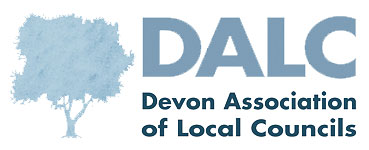Our Day at the DALC Conference – Okehampton Youth Councillors

At our conference on 2 October 2024, we were delighted to welcome two of Okehampton’s Youth Councillors to the event where they spoke at our Members Panel on Working with Young People.
Eleanor Reeve (18) and Meda Walker (16) both joined Okehampton Youth Council earlier this year, and came along to the conference to share their experiences.
We asked them if they could share what they thought of the day, why they’re interested in local government, and why it’s important for local councils to engage with young people.
Why are you interested in local government?
Eleanor shared that:
As a young person, I often feel as though my voice is insignificant in decisions that affect my life. That is why I am very interested in local government – it’s a great way to get involved and make a difference. By engaging with local government, I can help to address issues that impact my community. It also provides valuable experience that can open doors to greater political involvement in the future.
Meda said:
I’m interested in local government because I have always wanted to know how communities are run and the decision making process behind it all so I can be involved myself.

What did you think of the conference?
Eleanor commented that from the DALC conference she was able to learn more about how local councils operate, their structure, and their role in the community. She had the chance to connect with many experienced individuals who provided her with new perspectives and advice on getting involved. She says:
“I was particularly interested in hearing about how Brixham Council dealt with the water issues as it was a real life example of how local governments deal with crises”
Meda enjoyed getting to meet lots of interesting and experienced people at the conference, and learning about a wide variety of roles and areas within local government. She enjoyed the great opportunities for learning, and hearing from people from all sorts of backgrounds.
Both enjoyed being part of the panel with Meda reflecting that it was really valuable as a young person to have the opportunity to speak and share experiences around working with the local council since they could answer questions and think about different perspectives. Eleanor said that:
I enjoyed the panel as a whole because it was amazing to see how the different councils had been engaging their youth! It was good to see the different opportunities that they provided for young people. I am very grateful that I had the opportunity to share my thoughts on youth engagement and talk about the work of our Youth Council. Answering questions allowed me to express the benefits and opportunities that Youth Councils provide while also building my confidence in public speaking.

Why is it important to work with young people?
We asked the youth councillors why they felt it was important for councils to engage with young people. Meda said:
I believe it is really important for young people to work with councils as they are able to have a voice of their own and contribute a new point of view. I also think that raising awareness of the role of local government is valuable as it means that people are more likely to engage and feel connected to their community.
Eleanor added:
It is extremely important for councils to work with young people as they are the future leaders of government. It gives them a voice and helps them to feel heard and empowered.
Personally, I feel as though young people are able to feel more valued when involved and that their opinions can help communities to make more diverse improvements/changes.
How can councils work with young people?
Emma James, clerk to Okehampton Town Council, who spoke during the Members Panel about their experience setting up the Youth Council said:
I was delighted, if not a little daunted, to be asked to give a short presentation at the DALC Conference about Okehampton Youth Council. The Youth Council was set up earlier in the year so is very much still in its infancy. It needs some momentum to progress and attract new members as we currently only have eight Youth Councillors, but we are learning as we go and discussing what and how we can do this.
Two Youth Councillors, Eleanor and Meda, were able to come along to the Conference and answer some questions which, I hope was a beneficial experience both for them and the attendees
Alongside Okehampton, the Members Panel also featured Uplyme Parish Council and how they involved young people in their project to regenerate green space, and Moretonhampstead Parish Council who visited the local school to build relationships with young people.
Eleanor said that: Councils can engage with young people by starting up groups like Youth Councils, organising workshops and working with schools to start community projects. Also, I would suggest asking young people to complete surveys provided in schools which allow them to express their voices and make them feel as though their input is important in local decision making.
Meda reflected that the “panel as a whole was really well balanced as it included projects from smaller councils, showcasing how all communities can engage with their youth and that there is a wide range of opportunities available”.
Thank you so much to the youth councillors for not just attending our conference, but also taking the time to share their experiences with us afterwards. We know they’re both busy sixth formers, and are very grateful to them for taking time off school (and all the catch up work entailed) to be there, and we know attendees loved hearing their perspective! We’re wishing them both every success in the future!
NALC also have a wealth of resources centred around working with young people that councils can access (you may need to register for their website).
We always really love hearing what our members have been up to, whether you’re a very small council or a very large one, so that our member stories can reflect the huge range of amazing work that you are all doing in your communities. It also helps us put together panels like this one so our members can share their knowledge and learn from each other so please do take the time to reach out to us to tell us what you’re working on!
Newcomer of the Year at Exmouth Town Council!

Exmouth Town Council’s Climate and Ecological Emergency Resilience Officer, Zoey Cooper, has won Newcomer of the Year in the Resource Hot 100
Exmouth Town Council is thrilled to announce that Zoey Cooper, Climate and Ecological Emergency Resilience Officer, has been ranked #9 in the prestigious Resource Hot 100, securing the title of “Newcomer of the Year”.
The Resource Hot 100 celebrates individual achievements in the waste and resources industry. Since 2002, industry professionals have been invited to nominate and vote for those who have made significant contributions. This year, the Resource Hot 100 saw unprecedented engagement, with over 17,500 verified votes cast – a significant increase from previous years. This surge in participation underscores the growing importance of circular economy principles and the waste and resources sector’s pivotal role in addressing environmental challenges.
Zoey Cooper, relatively new to the waste resources sector, has made a rapid rise to prominence in less than two years. Her exceptional work as Climate and Ecological Emergency Resilience Officer at Exmouth Town Council has earned her the title of Newcomer of the Year. Cooper led the votes in this category for her swift and substantial contributions to the sector, exemplifying the impact that dedicated newcomers can make in a short time.
“When I woke up to the severity of the Climate and Nature Emergency, I threw myself into climate action,” Cooper explains.
This passion led her to transition from a career in marketing to her current role at Exmouth Town Council, where she has initiated a range of impactful campaigns in just 18 months, including:
- Exmouth Reusable Cup scheme
- Samudra the (plastic-eating) Sea Serpent
- A real nappy scheme
- Promoting reusable period products
- Clothes swapping
- Magpies: A Thrifty Festival
- Exmouth Festival: “Treading More Lightly”
For more information, please visit Exmouth Town Council’s website.
Thank you so much to Exmouth for sharing this fantastic story, and huge congratulations to Zoey! Councils are doing exceptional work to tackle the climate emergency and we’re delighted to see Exmouth’s work being recognised.
If there’s something at your council that you’re proud of, then please let us know!
Exciting News! Colebrooke Play Park – Official Opening
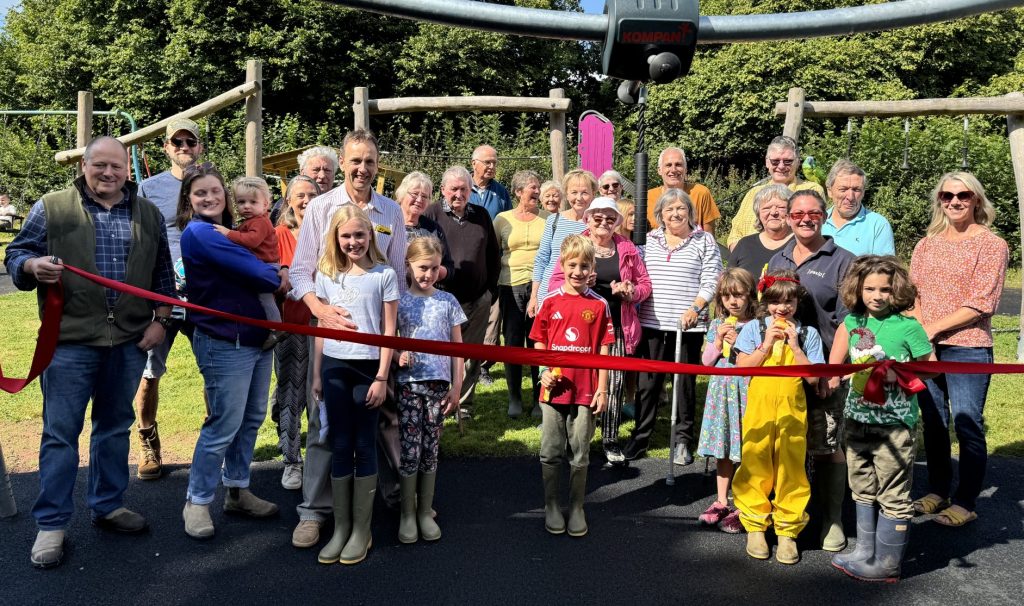
Members of Colebrooke parish were very excited to celebrate the opening of their re-vamped play park at the end of August
Members of Colebrooke Parish Council were very excited to celebrate the opening of their re-vamped play park at the end of August. The council initiated this project some time ago, starting with a big coffee morning to consult with local families about what they would like to see happen. A slide and roundabout were the initial priorities, but as the project grew, more equipment and facilities were added. The parish council increased its precept specifically to provide some funds for this work and in addition, other finance came from Section 106 funding and a grant from the Suez Community Fund, with a total overall cost of £39,874.
Penny Clapham, Parish Clerk said, “This is a huge achievement for Colebrooke; one which the Parish Council, working with other partners and parishioners has worked tirelessly for years to bring to fruition.”
Lots of great activities for the children and a great place to sit and have a cuppa! What a lovely project!
A play park is such a huge asset for a community, and are a quiet provision of local councils that are not always appreciated as they should be. We loved this story about how Colebrook consulted with the community to gather their thoughts, showing the importance of community consultation. The council then raised the funds, both through raising the precept and using planning obligations and a grant fund. An amazing piece of work, and a huge achievement indeed!
We love hearing about what our member councils have been up to, gathering your stories about new assets, facilities or services that you might be delivering for your communities. Please do take the time to share these projects with us; you can email us on enquiries@devonalc.org.uk or drop us a line through our Contact Us page.
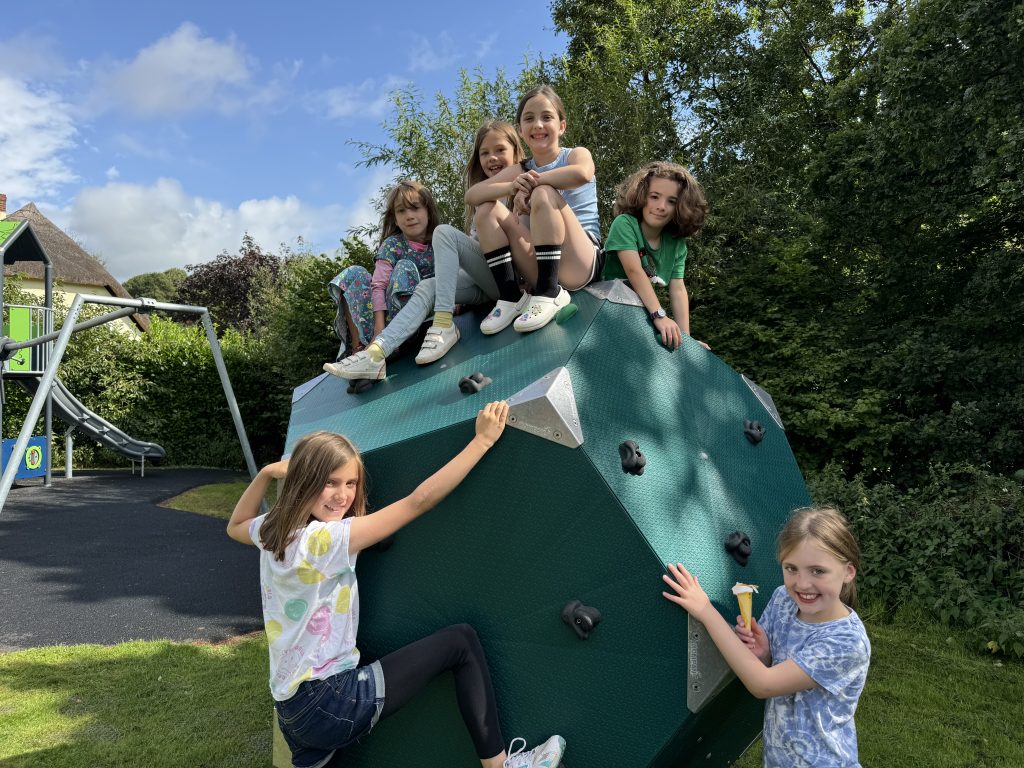
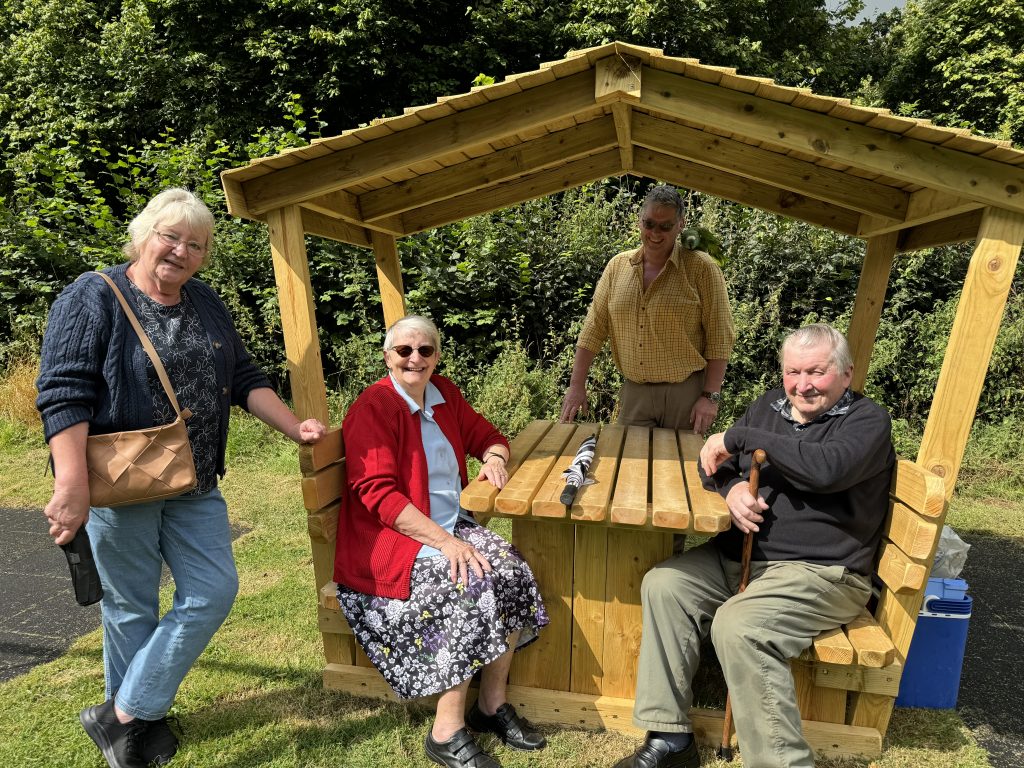
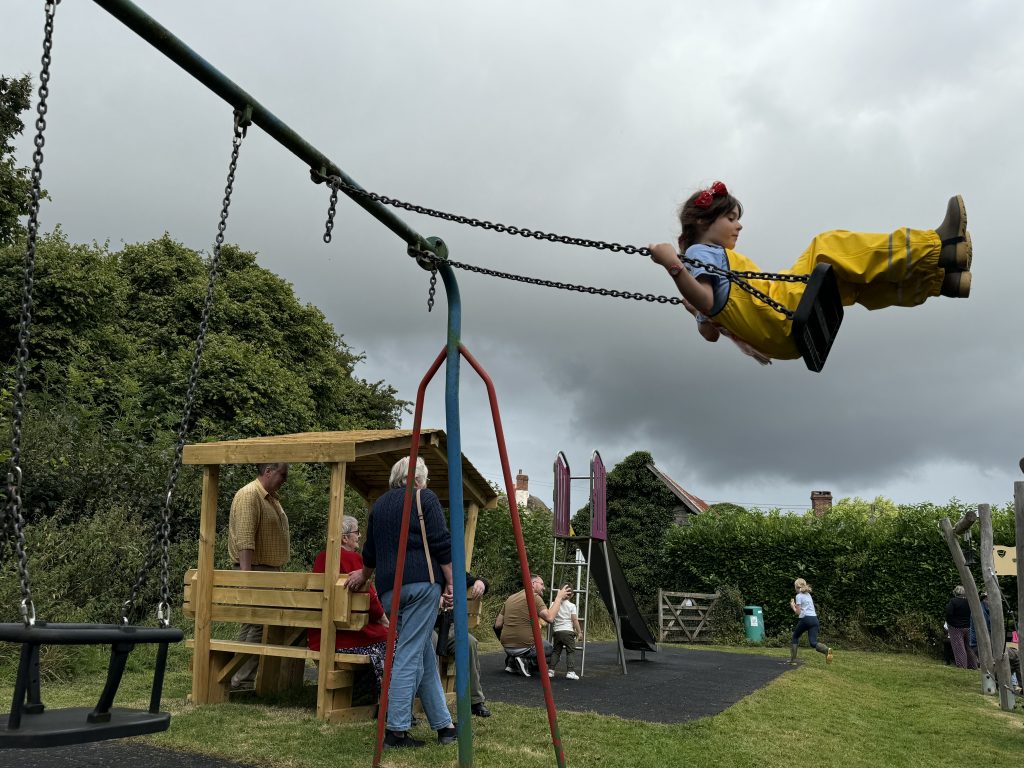
Community Champion Awards at the Annual Parish Meeting

South Brent Parish Council uses their Annual Parish Meeting for their Community Champion awards – a fantastic way to bring the community together!
We really liked this idea from South Brent Parish Council of offering Community Champion Awards at their Annual Parish Meeting to celebrate those who go above and beyond for their community. Councils are often asking us about how they can increase attendance at the Annual Parish Meeting or make it a more engaging event and while we have some suggestions already in our Knowledge Bank, we wanted to share this story!
This is a wonderful idea to not just utilise the Annual Parish Meeting, but also to raise the council’s profile and build links with their community in the area. Offering a Junior Community Champion Award also allows the council to work with younger people, helping to raise their awareness of the democratic process.
Thank you so much to the parish council for sharing; we really do love hear from our member councils about what you’ve been up to so please do tell us what you’ve been working on.
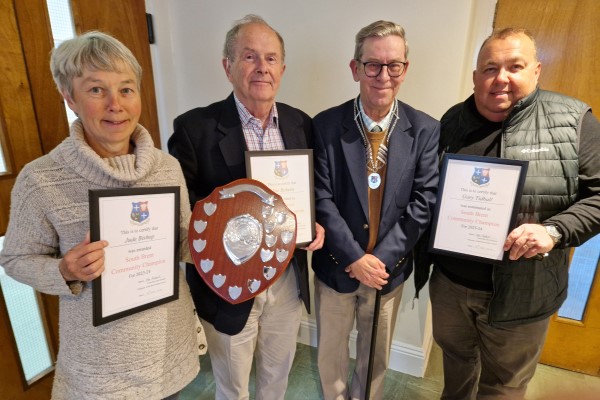
Community Champion Award Presentation (pictured left to right)
Jude Bishop, Community Champion 2023/24. Jude was nominated for her efforts cross several organisations – Sustainable South Brent, South Brent and District Caring, a local Refugee charity and is leading the development of a repair café
Mike Roberts, Nominee. Mike was nominated for his tireless efforts for the Royal British Legion. Acting as Standard Bearer at both the Act of Remembrance and Remembrance Service for many years, along with organising the hugely successful Annual Poppy Appeal
Councillor Glyn Richards, Chairman of South Brent Parish Council, presenting the Award and Nomination Certificates.
Gary Tidball, Nominee. Gary was nominated for his passion and commitment to the young footballers in South Brent. He started with an under 9’s team for his son and his friends. The team won the league and cup a couple of times over the following years and most of them still play now as a second men’s team, as they are now mostly 18.
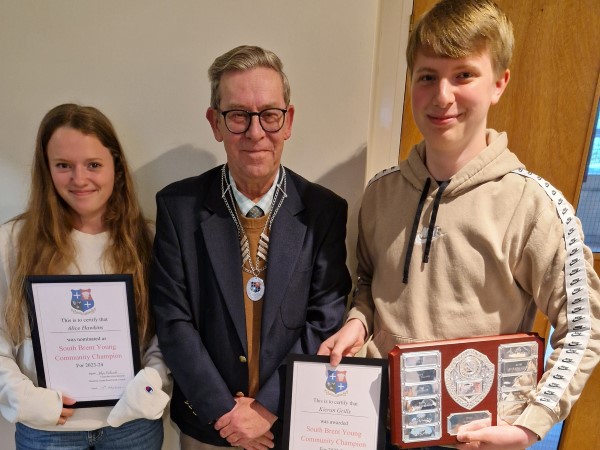
Junior Community Champion Award Presentation (pictured left to right)
Alice Hawkins, Nominee. Alice of Dartside Explorer Unit, was nominated for her help with the younger members of the Scout Troop is effective and enthusiastic. She is also a highly motivational young woman always willing to encourage and assist.
Councillor Glyn Richards, Chairman of South Brent Parish Council, presenting the Award and Nomination Certificate.
Kieran Grills, Junior Community Champion 2023/24 of Dartside Explorer Unit, was nominated for his assists with the younger members of the Scout Troop. His gentle and caring help is unfailingly thoughtful and appropriate. Kieran has an uncanny knack of knowing what needs doing, when and how. His contribution to the Explorer Unit is always a joy and is very effective. No matter what the task. Tidying up, cleaning-all tasks are completed with a big smile. In short Kieran is just great.
South Brent Parish Council helps local Scout Group
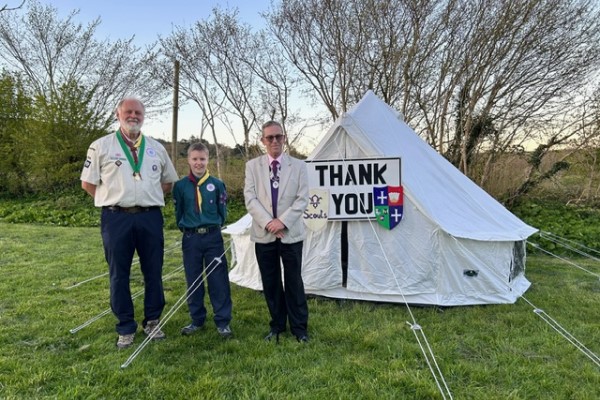
South Brent Parish Council helps the local Scout Group with a grant to buy new tents after theirs were ruined by the bad weather last year.
We love this story about South Brent Parish Council helping the local Scout Group. Local councils are integral to their local communities, and will often find ways to support organisations operating in the area to benefit the residents. This can be a powerful way of developing the council’s relationship with the community it serves, and help to raise the council’s profile. Working with youth organisations can also help young people understand the role of the council and perhaps spark an early interest in local democracy!
South Brent Scout Group were in urgent need of a new set of tents, as their previous set were ruined by the bad weather last year. Following an unsuccessful application to the National Lottery Awards for All fund, they applied to South Brent Parish Council for help.
The type of bell tents required are very expensive, costing approximately £1,100 for a complete package, and the Group were in need of 5 tents, given the numbers of Scouts, Cubs and Beavers in the Group.
At the end of the financial year, there was an underspend in the Parish Council’s Local Projects budget, so they were able to offer a significant grant to purchase three bell tents.
Initially, the group have purchased two tents, one 4 metre and the other a 5 metre to evaluate which best suits their needs.
Pictured (above) from left to right are South Brent Scout Group Leader Tim Haley, Scout Seb Jamin (who had written a letter of thanks to the Parish Council, on behalf of the Group), and Councillor Glyn Richards, South Brent Parish Council Chairman. The photograph was taken on the occasion of the whole Group renewing their Scout Promise on Friday 19 April 2024
Financial donations are not the only way that councils can help community groups; there are other alternatives such as:
- Signposting local groups in the direction of grants that they may be able to use
- Offering administrative support (i.e. help writing risk assessments for events or offering guidance)
- Helping with publicity for local groups such as offering the use of your website, social media, or noticeboards
- Loaning the use of your buildings for low or no cost
- Offering the use of equipment (e.g. the use of the council printer for flyers or loaning out litter picking equipment)
- Purchasing assets to gift to an organisation
If you are keen to support local groups, but not sure how it would be best to do this or whether you have a power to help, then you can always contact our Advice Service for guidance and we’ll be happy to help.
We really love hearing from all our members about what you’ve been up to, so please do take a moment to tell us what you’ve been working on by completing our Member Survey 2024 or emailing us.
Spring Clean in Ilfracombe!

A spring clean for Ilfracombe as the town council takes matters into their own hands with an initiative for cleaner streets!
Amid mounting frustration with the lack of response from principal councils regarding the state of Ilfracombe’s streets and pathways, Ilfracombe Town Council has embarked on a proactive initiative to take control of the town’s upkeep.
After receiving numerous letters from constituents and a report from concerned councillors, the town council felt compelled to address the issue directly. Frustrated by inaction, they made the bold decision to assume responsibility for making the necessary changes themselves.
One of the primary steps taken by the council was to redeploy some of their existing staff to assist the facilities team in addressing the neglected areas of the town. This initiative allowed them to mobilize resources effectively and tackle what locals commonly referred to as “grot” spots.
The recent Spring Clean campaign organized by the council aimed to prepare the town for the upcoming season. Collaborating with local groups proved to be instrumental in targeting specific areas for improvement. Additionally, council staff actively participated in the effort, even taking on tasks like painting the railings along the seafront. Although seemingly minor, such tasks have a significant impact on the town’s overall aesthetics and appeal.
The recent Spring Clean campaign organized by the council aimed to prepare the town for the upcoming season. Collaborating with local groups proved to be instrumental in targeting specific areas for improvement. Additionally, council staff actively participated in the effort, even taking on tasks like painting the railings along the seafront. Although seemingly minor, such tasks have a significant impact on the town’s overall aesthetics and appeal.
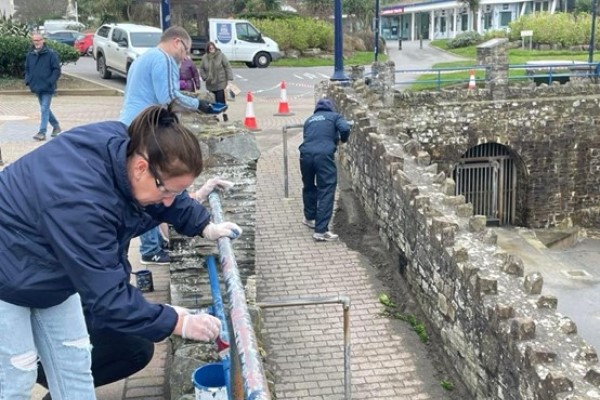
Buoyed by the visible improvements resulting from their efforts, it has been proposed to allocate one morning per month for staff to engage in community improvement activities. This initiative not only fosters team building among staff but also promotes positive mental health by providing an opportunity to step away from routine tasks and engage in meaningful outdoor work.
By taking matters into their own hands, the Ilfracombe Town Council has demonstrated a proactive approach to addressing community concerns and improving the quality of life for residents. Their hands-on involvement not only enhances the physical environment but also fosters a sense of pride and ownership among citizens. With continued dedication and collaboration, Ilfracombe can look forward to cleaner, more vibrant streets for all to enjoy.

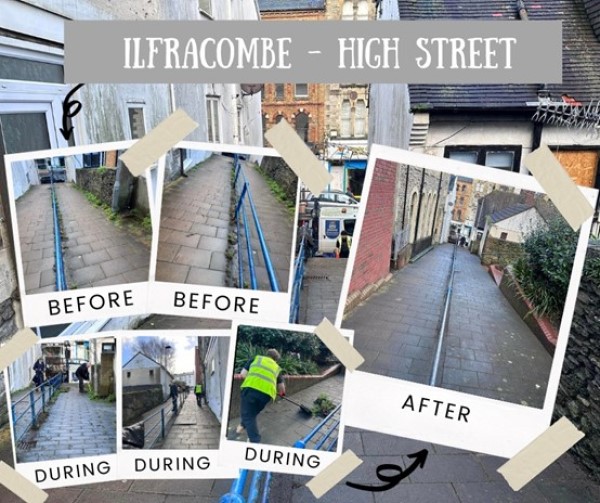
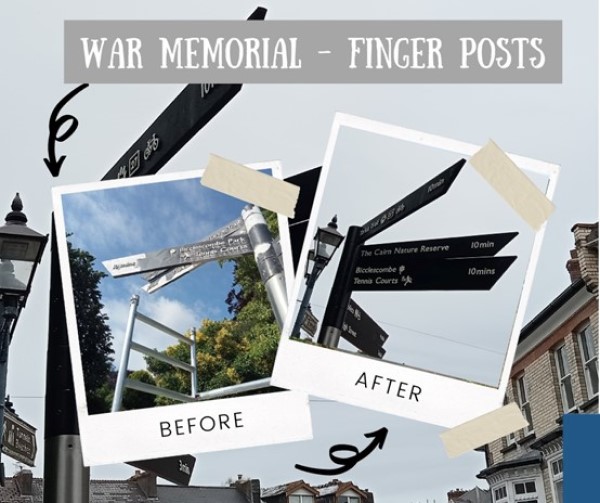
Thank you so much to Ilfracombe Town Council for sharing this story with us, showing what can be achieved when working together! We always love to hear from our member councils what you’ve been up to so please tell us about it – you can contact us here.
Moretonhampstead Parish Council visited the local school
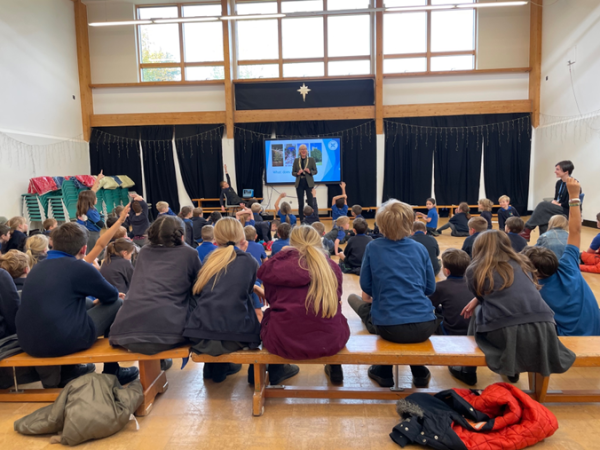
Moretonhampstead Parish Council made a school visit last week to explain the work that the council does in the parish and how children can get involved. Read our guest post from the clerk below to find out how it went!
Moretonhampstead Parish Council Chair Cllr Catherine Fileman-Wright and Clerk Sam Parkin visited Moreton Primary School last week to explain what the council does in the parish.
Easdon, Mardon and Beckaford classes listened to Catherine talk about council’s work including looking after the play park, biodiversity projects, restoring the churchyard paths, and organising community events such as the King’s Coronation celebrations and the Christmas lights switch on. The children were very excited to learn that the Clerk has Father Christmas’s phone number!
Catherine explained that there are 12 councillors who meet monthly, and together they make decisions for the benefit of the community. Sam told the children about her role which includes everything from looking after the council’s money to being a project manager.
The children did a quick quiz on how many swings in play park (a very loud 4!); when the council started (answers ranged from 1800’s to 1984); how many allotment plots and public seats are there (variety of guesses). There were lots of thoughtful answers from the children on why people would want to be a parish councillor.
When asked about the council’s work, many of the children told us they were worried about litter and dog fouling, they wanted the council to look after the environment, and to stop cars going too fast. The children had some great questions. Catherine was asked if she liked Christmas to which she replied yes! Both Catherine and Sam were asked how long they had been on the council (two and four years). Catherine was asked what her favourite part of being a councillor was, she explained that it was meeting members of the community and trying to help. The last question was to ask Catherine what she was wearing around her neck. She was wearing the Chain of Office and she told the children that it had a picture of the Cross Tree, Alms House and St Andrew’s church on it, and the names of the previous Chairs.
The children made Catherine and Sam feel really welcome and we hope the council and the school can work together to help do some of the things the children would like us to do. A big thank you to the school for inviting us along.
Thank you so much to Moreton’s clerk Sam Parkin for sharing this article with us. This is a fantastic way to raise the council’s profile, engage with the community and educate young people about the important work of local councils! I’m sure many of them will now feel empowered to reach out to the council to let them know what matters to them in the community in the future.
Sam has very kindly shared the presentation that they used in case any other councils would like to use it as a basis for their own school visit – Primary School Presentation.
NALC also has some resources and guidance on engaging with young people.
We love to hear from all our members what you have been up to, so please do take time to tell us what you’ve been doing and what you’re proud of!
Footpath maintenance at Stokenham Parish Council
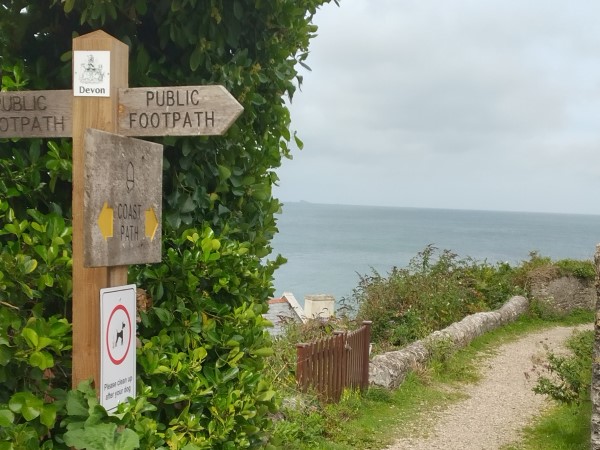
Footpath maintenance is a classic example of the important, but often unsung, work that parish councils do that has enormous value to their community.Read below from the clerk at Stokenham Parish Council about their important work in this area.
One of the footpaths in Stokenham parish, showing how their paths are unusual because they have steps down to the beach from inland paths. More photos below show some of the other footpaths that the council maintains.
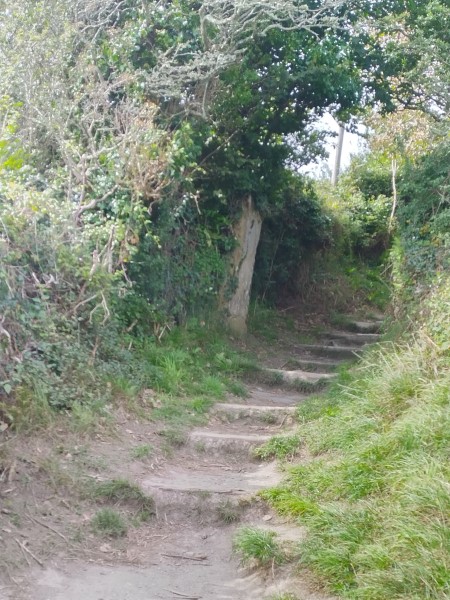
Footpaths are a community asset that can be taken for granted but stir up huge emotion if lost, diverted or unkempt. With walking, running and cycling on the increase they are being used more so the wear and tear is increasing but they remain the focal point for day trips, holidays and local usage alike.
Many records of historic paths places them on the Definitive Footpath map keeping them safe and maintained by the public purse. Then there are others that are remembered but long lost, whether changes in habits meant they fell into disuse or for some reason a permitted closure or development over them. Added to these are privately owned ones where people are allowed to walk. This is why it is important to know where parish paths are, talk to people about ones that used to exist and see if work can be done to reinstate and of course maintain what you have.
Stokenham Parish Council see their whole footpath, bridleway, permissive paths or any connecting accessways as one of the main parish assets. The reason for this is that these natural corridors provide access to many parish venues without using a vehicle and give real enjoyment to those walking, sightseeing, connecting and learning about nature, travelling to the beaches and using community facilities. This Parish has a long section of coastal footpath, some 13 miles, which comes under the care of Nature England, along with many inland paths that come under the care of Devon County Council. These are linked and complimented by Permissive Paths over which access is allowed due to agreements having been arranged between the landowners and Parish Council, who carry out maintenance on them.
As with any well used business or facility it is important that regular checks are carried out to ensure they are safe to use and cared for. This is why Stokenham Parish Council see their parish footpaths as an asset that needs checking and reports received of fallen trees, overgrown undergrowth or even flooded areas and erosion are highlighted at meetings. With so many involved in the care of this network it is not always possible to do something immediately but most matters can be dealt with either by a few volunteers or liaising with the Footpath Officer. The removal of fallen trees often just needs someone to report it to the landowner who may be unaware. The same goes for overgrown undergrowth. Sometimes this can be down to County footpath cutting but mostly it is overgrown hedges and the like which belong to the adjacent landowner. Having a good community understanding of how much revenue locals and visitors bring to the area by being able to walk these paths makes approaching landowners better through a friendly phone call rather than formal letters that can often be taken the wrong way! Whilst major enhancement works need planning and funding day to day awareness and care can make all the difference with very little cost. In the hectic world we live in some property owners do not know that at the end of their garden or their field just a little bit of maintenance will make a huge difference and often welcome suggestions. So one simple task to do is identify the contact details of all adjacent landowners to footpaths and bridleways making a quick call much easier.
Stokenham over the years have put together additional projects to enhance the links where possible and drawn in many grants One permissive path takes people off the main road and goes across seven landowners land and took inviting all those landowners into one room to discuss a solution. Another is only about 20 feet long but takes walkers safely along pavements and then through the link to a park without going on the main road, that has no pedestrian provision. Ensuring that locals and visitors can walk around safely means vehicles can be left behind and people will walk to local facilities rather than taking their money outside the parish. It also gives the community a chance to meet and chat whilst encouraging healthy exercise.
Another important part of footpaths is the natural wild flowers and vegetation so leaving the sides just a bit more overgrown and rural can provide an important haven as a wildlife corridor!
Thanks to Gill Claydon, clerk at Stokenham Parish Council for sharing their story; we completely agree that footpath maintenance is vital and is often overlooked as a key service that a parish and town council can offer. The Parish Paths Partnership scheme in Devon is used by many local councils to help maintain footpaths.
We always love to hear from our member councils about what they’ve been up to so please do share your stories with us.
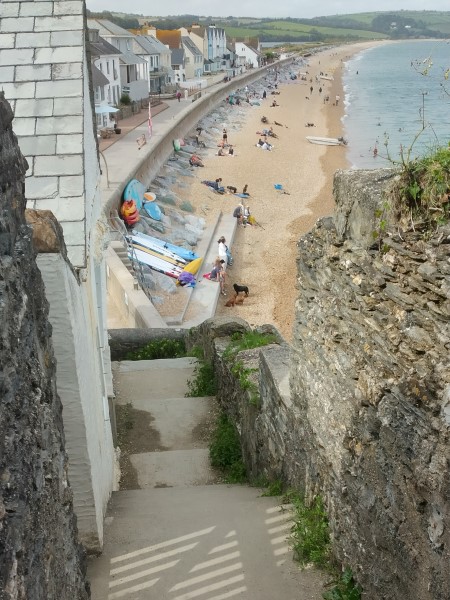
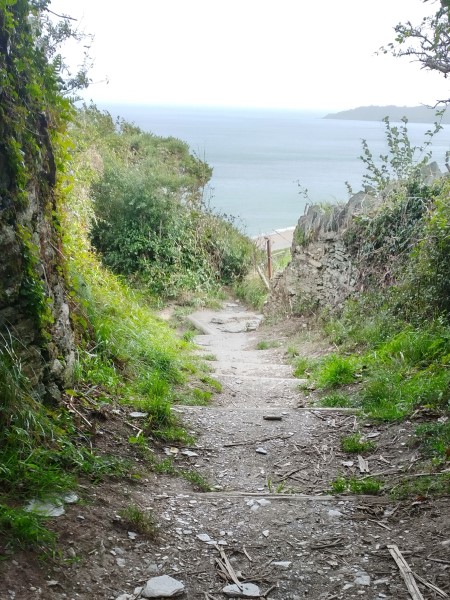
A new logo for Buckland Brewer Parish Council!
Buckland Brewer Parish Council has a new logo reflecting the community’s heritage and landscape. This is a project they’ve been thinking about for years and is an excellent way to highlight the council’s work around the parish, raising their profile!

The new logo came about because:
- the council had been discussing having an official letterhead for some time and,
- councillors had reflected that parishioners weren’t acknowledging projects that the council had carried out which may have been because the council wasn’t highlighting their involvement
The clerk and the council’s webmaster were very keen to make Buckland Brewer Parish Council more visible, with compelling communication for all parishioners. They wanted an eye-catching logo that would be immediately recognisable as a council communication in any medium.
They decided on bespoke branding to reflect Buckland Brewer’s heritage and the webmaster came up with the very effective design you can see above. The design references shapes on key local landmarks (see below), and the wavy lands are a nod to the surrounding landscape and Buckland Brewer’s heritage as a rural farming community. On the footer design for letters or compliment slips (see the bottom of this page), a gold tractor has been added on the hill as a tongue-in-cheek touch reflecting that tractors are constant in the area.
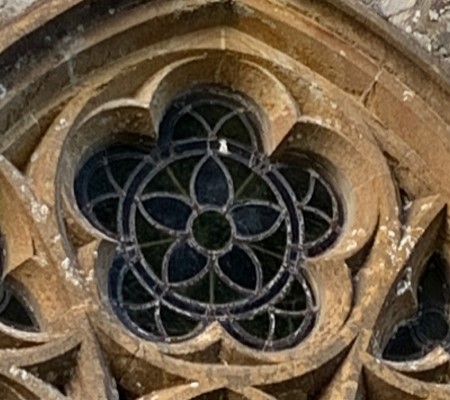
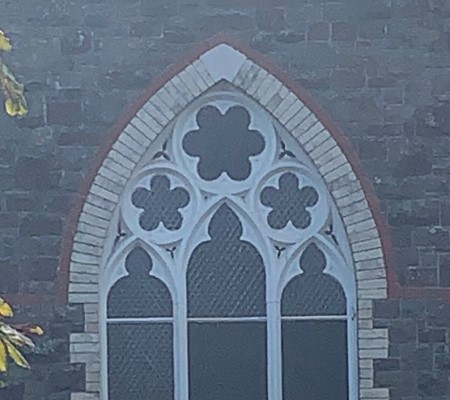

The five petalled flower echoes shaped windows in both the Church of St Mary and St Benedict, and the Methodist Chapel.
A triquetra (celtic knot) appears on the war memorial
All feedback from parishioners on the new logo has been very positive. The council is using the logo on everything relating to the council, which they have found a relatively easy way to raise the council’s profile, especially with newer residents and a slightly younger demographic.
If you’re interested in doing something similar for your council, they recommend using a new design and steering away from the past. The clerk initially starting researching coats of arms, prominent people and other historic references for inspiration, but it quickly became clear that some imagery and personal history could be deemed ‘problematic’ today, especially with a deep delve. Plus, a brand new logo is a great opportunity for creativity and a fresh start!
Thanks to Buckland Brewer Parish Council for sending us this story, we often recommend a logo to councils who don’t have one as an effective way to raise your profile and make sure you get credit for all the great things you do! A logo can go on your benches, bins or buildings, as well as your letters.
If you have a story you’re proud of, then please do send it to us, we love to hear from our member councils.

20s Plenty – guest post from Totnes Town Council

Are you keen to make your city, town or village a safer and more pleasant place to be? Learn more about the 20s Plenty campaign and how you can get involved.
DALC understands that speeding is an important issue for our member councils; road safety and traffic management are common topics raised by communities. We are keen to support councils to have greater influence in resolving local concerns, and recognise that collaboration and information sharing enables councils to explore new approaches.
We’re delighted to feature this guest post from Totnes Town Council in partnership with the 20’s Plenty campaign; read on to learn about the campaign, with details of upcoming webinars, and how you get involved by working with Totnes!
Are you keen to make your city, town or village a safer and more pleasant place to be? Campaigning for 20mph default speed limits is a powerful step in the right direction.
‘20s Plenty for Us’ campaign for a 20mph speed limit to be the norm on residential streets and in town and village centres, unless full consideration of the needs of vulnerable road users allows a higher limit on particular streets.
What are we looking to achieve?
There are many reasons why – here are 4 good ones:
- They’re safer: The Department for Transport estimates that a 1mph lower speed in built-up areas reduces road casualties by 6%. Successful 20mph schemes result in 30% fewer casualties.
- They’re cleaner and quieter: 20mph reduces tail-pipe emissions by 25% compared with 30mph and are 50% quieter. They also encourage more cycling and walking.
- They’re affordable and cost effective: They provide multiple economic, societal and environmental benefits at low cost. Entry signs plus repeaters remind drivers of the speed limit, with no need for physical calming. Even with no additional police enforcement, speeds reduce by up to 6mph on faster roads.
- They’re popular: National and local surveys consistently find 70% support in residential streets; such support rises after 20mph limits are introduced. They also rarely affect journey times or bus timetables.
Rather than request that highways authorities implement 20mph zones sporadically across the county, it is much more effective to campaign for counties to change its speed limit policy and make 20mph the default.
Demonstrating widespread local community support for 20mph helps to persuade highways authorities to implement it more widely and cost-effectively. Counties in England, such as Cornwall, Oxfordshire and Lancashire, have agreed 20mph for every settlement, as have counties throughout Wales, and it has been promised by the Scottish Government. You can find more evidence on the 20s Plenty website.
Are you willing to write to a highways authority to confirm your support for 20mph and to ask them to roll out 20mph more widely?
Keen to know more?
Adrian from the 20s Plenty for Us campaign will be running two webinars for interested Devon town and parish councils on:
Wednesday 21 June 7.30-8.30pm. Register in advance here.
Thursday 28 June 1-2pm. Register in advance here.
Contact the 20s Plenty for Devon campaign to find out how you can get involved. Email 20splenty.devon@gmail.com or find them on Facebook.
Collaborate with Totnes Town Council
Totnes Town Council would like to work with other Devon councils on this issue; please take a moment to complete this snapshot poll so we can gather your views on how important speed reduction is to your community, with a chance to leave your details for Totnes if you’re interested in collaborating.
